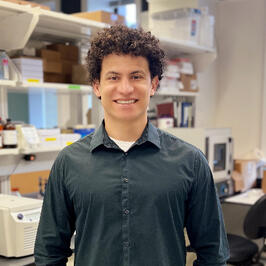Plenary and Keynote Speakers
Omar Akbari
Omar Akbari received a B.S./M.S. in Biotechnology from the University of Nevada, Reno in May 2005. In December of 2008, he received a Ph.D. in Cell and Molecular Biology from the University of Nevada, Reno where he studied transcriptional regulation during development while working with professors Robert Drewell and Chi-Yun Pai. He then joined the laboratory of professor Bruce A. Hay at the California Institute of Technology as a senior postdoctoral scholar where he used principles of synthetic biology to develop population control technologies for animals. In 2015, he became an Assistant Professor of Entomology in the Center for Infectious Disease Vector Research (CIDVR) at the University of California, Riverside. In fall of 2017, he then joined the faculty as an Assistant Professor in the Department of Cell and Developmental Biology, within the School of Biological Sciences, at the University of California, San Diego. In 2018 he co-founded Agragene a biotechnology based startup. In 2019 he was promoted to Associate Professor (with Tenure), followed by a promotion to Professor in 2021. In 2022, he co-founded Synvect a biotechnology based startup in San Diego, CA.
Craig Montell
Craig Montell received his B.A. from the University of California, Berkeley in 1978, and his Ph.D. from the University of California, Los Angeles in 1983. He returned to UC Berkeley in 1984 as a Damon Runyon postdoctoral fellow. It was there that he discovered the founding member of the Transient Receptor Potential (TRP) family of ion channels, while working on Drosophila phototransduction. In 1988 he joined the faculty of the Departments of Biological Chemistry and Neuroscience at the Johns Hopkins University School of Medicine (JHUSOM), where he remained for nearly 25 years. At the JHUSOM his group identified the founding mammalian TRP channel, TRPC1. Dr. Montell moved to the University of California, Santa Barbara in 2013 as a Duggan Professor of MCDB and Neuroscience. He is a recipient of an NSF Presidential Young Investigator Award, an ACS Junior Faculty Award, and has received honorary doctorate degrees from the Catholic University, Leuven, Belgium in 2010 and from the Baylor College of Medicine in 2011. In 2013 he was elected a Fellow of the American Association for the Advancement of Science (AAAS). In 2016 Dr. Montell was appointed a Distinguished Professor, University of California, Santa Barbara.
His laboratory focuses on the control of insect behavior in response to sensory input. We are focusing on the mosquito disease vector, Aedes aegypti, which infects hundreds of millions of people each year with the viruses that cause dengue, yellow fever and zika. We are conducting projects to provide new insights into how this mosquito finds their hosts, and the cellular and receptor mechanisms (e.g. TRP channels and opsins) that allow them to do so. In addition, we are devising approaches to improve strategies to suppress populations of these invasive mosquitoes, and reduce the incidence of mosquito-borne disease.
Anupama Dahanukar
Our primary research interest is to understand molecular and neural mechanisms underlying chemosensory behavior. We focus on the gustatory system of the fruit fly, Drosophila melanogaster, which although numerically simple is capable of sensing a wide array of chemical cues and driving appropriate behavioral choices for feeding, courting, and selecting sites to lay eggs.
We focus on three main lines of investigation. First, we are interested in understanding the molecular and cellular basis of taste recognition by identifying receptors involved in deletion of specific taste cues and investigating their structure and function Second, we are interested in understanding how taste sensory information is processed and interpreted to engender specific behaviors, for which we are using anatomical and functional criteria to trace taste circuits. Third, we are interested in the effect of other sensory input, prior experience and nutritional status on various aspects of feeding behavior. We use a multi-disciplinary approach including molecular, genetic, ontogenetic, electrophysiological, behavioral and imaging techniques to study these questions.
Lark Coffey
Lark Coffey obtained her Ph.D. from the University of Texas Medical Branch. Before joining UC Davis in 2013, she worked at Institut Pasteur, Paris and the Blood Systems Research Institute at the University of California, San Francisco.
Karthikeyan Chandrasegaran
Our research focuses on understanding the ecology and behavior of mosquitoes to address pressing public health challenges. We study how environmental factors like predator presence, resource availability, and urban conditions shape mosquito traits such as behavior, survival, and disease transmission potential. Our lab uses a combination of field studies, laboratory experiments, and computational approaches to uncover key insights into mosquito ecology. By understanding these complex interactions, we aim to develop innovative strategies for mosquito control and the prevention of mosquito-borne diseases such as dengue, West Nile virus, and malaria.
We are passionate about advancing mosquito research while training the next generation of scientists to tackle global health issues through multidisciplinary and impactful research.
As a biologist, I am aware that diversity is key to any healthy ecosystem. Extending this concept to a classroom, I value the diversity of students I mentor as a scientist and a teacher. I believe in leveraging diverse student identities in the learning process to bring out their multiple perspectives on course material. Such conversations in a learning environment will encourage students to devise their own scientific identity that can facilitate their learning within the confines of a classroom and beyond. I've had the opportunity to co-teach and guest lecture in several courses and workshops as a graduate student and a postdoc. Concurring with Prof. Richard P. Feynman, I view every teaching opportunity as a mutual learning experience.
Luciano Cosme
My research focuses on natural genetic variation in mosquito populations that transmit significant arboviruses such as dengue, Zika, chikungunya, and others. I concentrate on three key traits: vector competence - the ability of female mosquitoes to transmit these viruses; photoperiodic diapause - a trait that has enabled the Asian tiger mosquito to spread rapidly across the USA; and insecticide resistance. Utilizing genomic tools, I analyze data from wild populations and laboratory experiments to discover the genetic architecture of these traits. My goal is to understand how natural genetic variation contributes to the success of these mosquito vectors, how it is maintained, and how we can leverage this knowledge to develop new monitoring and control strategies to reduce the spread of these diseases.






